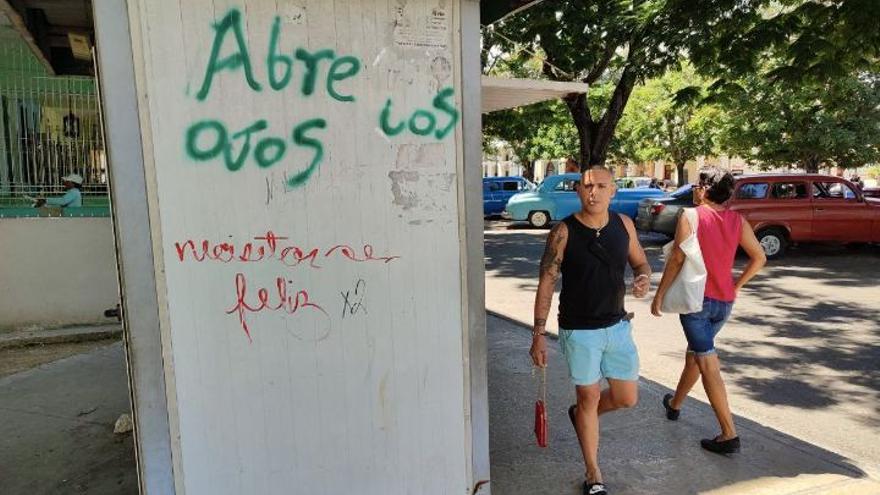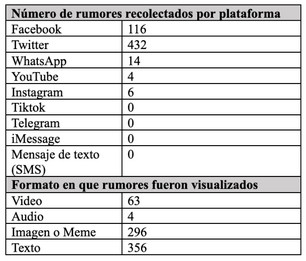
![]() 14ymedio/Yucabyte, Havana, 19 April 2023 — Irregularities during the parliamentary elections, the drastic increase in crime and the precarious situation of prisons have dominated the flow of rumors about Cuba on social networks during the month of March. However, despite the fact that it is fragmentary data and not always verifiable, it forms a fabric of “underground” concerns that in the long run –as a recent report by 14ymedio and Yucabyte demonstrated– tends to become real information in Cuba.
14ymedio/Yucabyte, Havana, 19 April 2023 — Irregularities during the parliamentary elections, the drastic increase in crime and the precarious situation of prisons have dominated the flow of rumors about Cuba on social networks during the month of March. However, despite the fact that it is fragmentary data and not always verifiable, it forms a fabric of “underground” concerns that in the long run –as a recent report by 14ymedio and Yucabyte demonstrated– tends to become real information in Cuba.
The general tension during the elections for deputy candidates in Parliament had its correlation in the digital environment. Many users disclosed not only the “traps” of the Government to attract voters or force them to go to the polls, but also the supposed consequences of abstaining.
It was even stated that whoever attended the polling station after applying for a visa or parole at the US Embassy would automatically lose their right to access this service. The spread of this rumor was so alarming that the Ministry of Foreign Affairs itself claimed that it had contacted the US immigration authorities to deny the information.
Although no independent observers were allowed to verify the transparency of the voting, thousands of users left their impression on Twitter and Facebook. Many denounced what was jokingly called “Operation Tun-Tun”: the electoral authorities not only forced children to guard the ballot boxes, but sent them, house to house, to carry out reminders to guarantee broad participation. Despite this, users on the networks commented that many had avoided the polls. Others recounted that they had voted “a la cañona”, (by force) fraudulently representing several relatives, or that they had found their forged signature on the list of participants.
A clandestine group began to claim responsibility for several anti-government posters. These ‘graffiti’ contained offensive messages directed at the régime
In the heat of the elections, a clandestine group began to claim responsibility for several anti-government posters. These graffiti, reported by the independent press, contained offensive messages directed at the regime such as “Down with the dictatorship” and “No to the Communist Party”, signed by the organization identified as El Nuevo Directorio.
As for the second source of rumors, reports of robberies, assaults, rapes and adolescent gangs in the Cuban peripheries are already common on social networks. In the face of police inaction, reporting from digital profiles is one of the few alternatives in the hands of the population to make visible the wave of crime that is spreading through Cuba.
The ravages of a youth gang known as C39, which operates in Las Tunas, presumably under the command of an adult woman, has kept the country folks in check. The local Police, they say, are sitting idle and it is said that they even grant impunity to delinquents.
The agents did arrive on time, several users say, when two men tried to rape a male child in the city of Nuevitas, Camagüey. However, in this case too, the action of the local residents, who began to act on their own, was decisive in stopping the crime.

Also unprotected, according to multiple reports, remain the residents of the capital’s Altahabana neighborhood, who suffer frequent assaults in their own homes. Under the guise of “messengers” who have come to deliver a package, they break into homes to rob residents, threatening them with bladed weapons.
Others are not so lucky and, after the encounter with the criminals, they end up getting murdered. This is what happened, says a user, to a rural resident from San Juan de los Yeras, in Villa Clara, who was stabbed after his horse was stolen.
Although it is rare that the official media or the Ministry of the Interior offer an official version of the facts, some institutions often expose various details. This was the case with the death of a baby abandoned by his mother, a student at the Villa Clara Sports Initiation School. It was the directors of the center who, in a brief Facebook statement and during a meeting where recorded conversations were leaked, commented on the seriousness of the event.
The most difficult rumors to verify are those that refer to the most hermetic environments monitored by the regime, such as prisons. The conditions in which the prisoners live had traditionally been one of the best kept secrets by the Government. However, the increase in the prison population in the Country, and the media attention that, since the protests of July 11, 2021, has focused on prisons, have helped to clarify how the inmates live.
The harassment and manipulation suffered by the relatives of political prisoners by jailers or State Security has also been exposed on social networks
A common prisoner, identified as Kevin, was allegedly beaten to death by his jailer, Yulieski Montero, at the Quivicán prison in Mayabeque. Those who shared the event charged that other inmates throughout the country have suffered mistreatment at the hands of the police officers who guard them, or by other prisoners, whom the guards incite to punish the “troublemakers”.
The harassment and manipulation suffered by the relatives of political prisoners by jailers or State Security agents when they go on regular visits has also been exposed on social networks. However, it is rare for the relatives of common prisoners to air events like these, for fear of reprisals and the consequences that the complaint could have for the inmates themselves.
This type of situation results in that, although a large part of the rumors collected become, in the long run, sources of verified information – or end up being denied – there is other information that cannot be verified. This “informal” flow of data runs parallel to the regime’s press and often becomes a counter-narrative of the official version of events.
However, there is also the case of rumors that remain static, without being able to be verified or denied, and that have become a constant in the collection. This is the case of the illness and death of Raúl Castro –and also of other leaders, such as Ramiro Valdés–, a rumor repeated throughout 2022 which has also been registered in the first months of 2023. Or of the reports about a “fraudulent transition” or “fraud change”, which describe a sort of conspiracy by the regime’s leadership to fake a transition to democracy from the seat of power itself, without compromising the interests of certain military clans historically linked to the Castros.
____________
COLLABORATE WITH OUR WORK: The 14ymedio team is committed to practicing serious journalism that reflects Cuba’s reality in all its depth. Thank you for joining us on this long journey. We invite you to continue supporting us by becoming a member of 14ymedio now. Together we can continue transforming journalism in Cuba.
